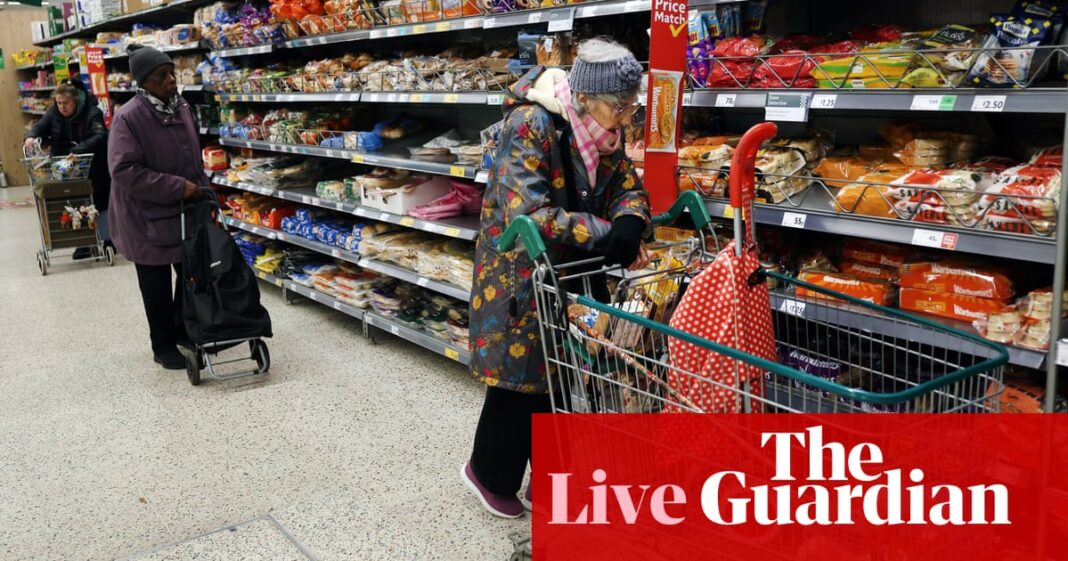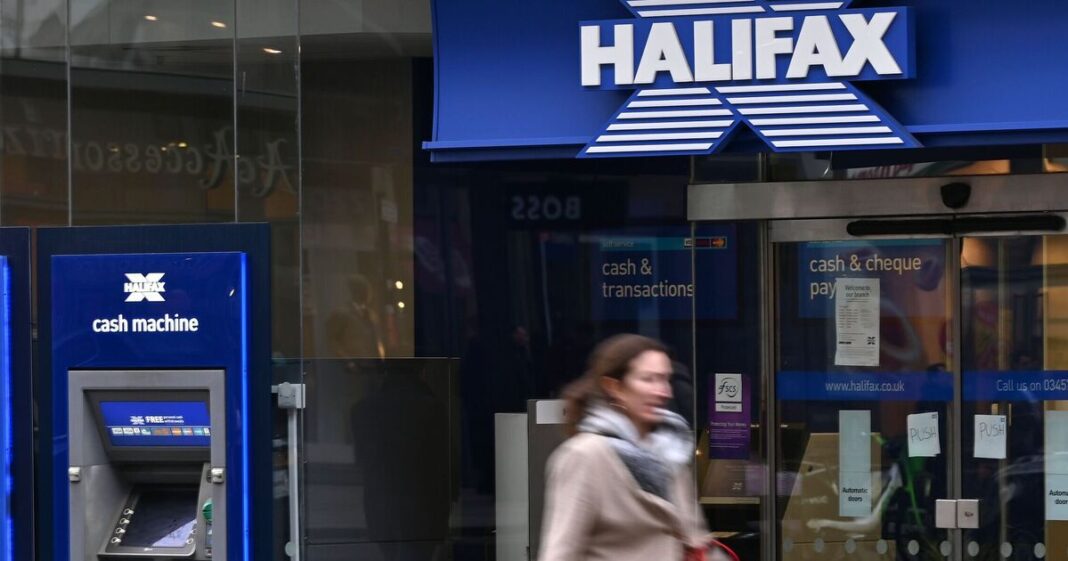Introduction: Transport, food costs and private school fees push UK inflation up to 3%
Good morning, and welcome to our rolling coverage of economics, the financial markets and the world economy.
Inflation in the UK accelerated more than expected last month due to higher transport and food costs, as well as a jump in private school fees.
The latest data, just released by the Office for National Statistics, shows that the consumer prices index (CPI) measure of inflation rose to 3% in the 12 months to January, up from 2.5% in December. Economists had expected inflation to climb to 2.8% in January.
On a monthly basis, CPI fell by 0.1% in January, compared with a 0.6% fall in January 2024.
Transport costs rose at the fastest annual rate since February 2023 because of air fares and fuel prices, which both fell by less than last year, partially offset by a downward effect from secondhand cars.
Air fares tend to rise into December and fall into January. However, this time this pattern was less pronounced than in previous years, the ONS said.
Food prices rose by 3.3% in January, up from 2% in December. Meat, bread and cereals, fish, milk, cheese and eggs, chocolate, coffee and tea and juice all became dearer.
Private school fees were another factor, where prices rose by 12.7% on the month but did not change a year ago, after the government decided to impose VAT of 20% on private school fees.
The chancellor, Rachel Reeves, said:
Getting more money in people’s pockets is my number one mission. Since the election we’ve seen year on year wages after inflation growing at their fastest rate – worth an extra £1,000 a year on average – but I know that millions of families are still struggling to make ends meet.
That’s why we’re going further and faster to deliver economic growth. By taking on the blockers to get Britain building again, investing to rebuild our roads, rail and energy infrastructure and ripping up unnecessary regulation, we will kickstart growth, secure well paid jobs and get more pounds in pockets.
The core rate of inflation, which strips out volatile food and energy costs, climbed to 3.7% from 3.2%.
Here is our first take:
The Agenda
Key events
Glencore considers ditching UK listing
Glencore is considering ditching its primary listing in the UK in favour of New York or another location where it can “get the right valuation”.
This would deal another big blow to the London Stock Exchange, which has been hit by a string of high profile departures.
Chief executive Gary Nagle said the company was assessing whether other exchanges were “better suited to trade our securities”. He told journalists:
Ultimately, what we want to ensure is that our securities are traded on the right exchange where we can get the right and optimal valuation for our stock. There have been questions raised previously around whether London is the right exchange.
If there’s a better one, and those include the likes of the New York stock exchange, we have to consider that.
While UK inflation has hit 3%, interest rate cuts are still on track, says Philip Shaw, chief economist at Investec.
Today’s headline figures are above the 2.8% which the Bank of England had pencilled into its forecasts in its Monetary Policy Report earlier this month. We gain some comfort though that neither core nor services inflation exceeded our expectations, as this points towards inflation strengthening due to ‘volatile’ or one-off items.
Indeed what matters is not so much the precise peak in inflation, but the length of time it subsequently takes to subside towards the 2.0% target.
What the MPC will pay particular attention to is evidence on whether increases in inflation are feeding through to wage deals, which would risk entrenching inflation into the medium-term. To our minds a weak economy is likely to result in a further loosening in labour market conditions, helping to push wage growth down, enabling the committee to cut rates ‘gradually and carefully’ through the course of this year, as its guidance suggests.
Jet2 sees only ‘modest’ price increases

Joanna Partridge
Travel firm Jet2 said its prices remain “keen” for travellers heading on trips between April and June, as it continues adjusting to a trend for later booking, as customers wait to buy their tickets.
The Leeds-based company – which flies to European destinations from 12 UK airports and is due to start departures from Luton in April – said “pricing remains keen” for its package holidays which had only a “modest average increase” since a year earlier, while it had only “slightly” raised the price of its flights.
It came as the company forecast it would report a group profit before tax and foreign exchange revaluation between £560m – £570m for the 12 months to the end of March this year, representing an 8% to 10% increase on a year earlier.
Jet2 said it was facing higher costs related to inflation, especially for hotels, aircraft maintenance and airport and air traffic control charges. However it added that government changes to the national living wage and national insurance threshold would also push up its wage costs.
Jet2’s chief executive, Steve Heapy, said the firm recognised the economic environment and
the many demands placed on consumer discretionary incomes, which combined with the later booking profile and cost headwinds details, may mean profit margins in the year ahead come under some pressure.
The EY Item Club forecasting group said January’s hotter inflation largely reflected one-off factors. It cautioned that inflation is likely to remain elevated throughout 2025 due to higher energy prices, the effect of weaker sterling on imported goods prices, and companies passing on some of the rise in labour costs to consumers.
However, these factors are probably temporary, and the EY Item Club still expects the Bank of England to stick with its gradual approach to loosening policy, with the next rate cut coming in May.
Matt Swannell, chief economic advisor to the EY Item Club, explained
Though inflation will likely dip over the next couple of months, we expect a renewed pickup from April. The energy price cap is set to rise by more than 6% in April, so the energy category is expected to provide upward pressure to headline inflation from the spring. Having only made a partial recovery since the turn of the year, weaker sterling should push up prices in import-intensive categories such as food and core goods. Meanwhile, businesses are likely to pass on some of the rise in labour costs caused by the increases in employers’ National Insurance Contributions (NICs) and the national living wage.
January’s higher reading for services inflation was widely anticipated, and it’s unlikely the MPC [monetary policy committee] will have seen much in today’s release to concern them. We expect the MPC will continue with its ‘cut-hold’ approach to loosening policy for now, with the next rate cut likely to come at its May meeting.
Janet Mui, head of market analysis at the wealth manager RBC Brewin Dolphin, noted that the Bank of England had factored in higher inflation, and that weak price pressures in areas like clothing and household goods could be symptoms of cautious discretionary spending.
Today’s inflation data and yesterday’s wage data highlight the persistence of price pressures in the UK. The Bank of England has already pencilled in a reacceleration in inflation this year, so this should not come as a surprise to policymakers. At the margin, it is a reminder for the Bank to proceed with caution in terms of rate cuts…
It is hard to justify a rate cut in March when services CPI is 5% and wage growth is 6% year on year, while GDP and employment data have been better than thought as of late. The policy direction will be driven by the Monetary Policy Committee’s judgement between averting growth risks versus containing inflation.
For now, the priority is inflation. But things may change throughout the year as business surveys are overwhelmingly negative. Market reaction is relatively muted and bond traders continue to price in about two more rate cuts by the end of 2025.
In food, seven of the 11 food and non-alcoholic drinks categories contributed to the jump in UK inflation to 3% last month, the ONS said.
Balwinder Dhoot, director of industry growth and sustainability at the Food and Drink Federation, said food prices are likely to rise further in coming months, partly due to the impact of higher labour costs on companies. He explained:
Whilst food and drink manufacturers continue to work hard to keep costs down for consumers, we saw food and drink price inflation surge to 3.3% in the first month of 2025, up from 2.0% in December 2024. Rising energy and water bills as well as higher commodity prices, like dairy and cocoa, are all having an impact on production costs.
Unfortunately, this month isn’t likely to be a flash in the pan for rising food and drink prices. We’re yet to see the full impact of increasing labour costs, with changes to both National Minimum Wage and National Insurance Contributions coming into force in April, and we expect to see this filter through to shoppers over the coming year. We urge government to work with industry to simplify regulation and bring business costs down to help protect consumers from rising prices.
Let’s look at transport costs in more detail.
Overall transport prices rose by 1.7% in the year to January. Air fares fell by 19% between December and January, less than the near-39% drop a year earlier, the ONS said.
Turning to fuel, the average price of petrol rose by 0.8 pence a litre between December and January to 137.1p, versus 139.9p a litre in January last year. Diesel prices rose by 1.5p a litre to 144.1p a litre, down from 148.3p a litre in January 2024. This meant overall motor fuel prices fell by 2.2% compared with a 5% decline a year earlier.
Prices of secondhand cars fell by 0.4% last month, compared with a monthly rise of 1.5% a year earlier.
March rate cut looks even more unlikely, economists say
Chances of an interest rate cut next month have receded further. Financial markets now see a 17% chance of a reduction then, down from 24% before the jump in inflation was revealed by the UK statistics office.
Markets are still expecting two more rate cuts by the end of the year.
The pound briefly spiked after the data, but it now up just 0.06% at $1.2617 against the dollar.
Monica George Michail, associate economist at the think tank National Institute of Economic and Social Research, said on X:
Inflation will probably rise further to around 3.5% in the second half of this year, said Ruth Gregory, deputy chief UK economist at the consultancy Capital Economics.
We doubt this will prevent the Bank of England from cutting interest rates further. But it will mean it continues to cut rates only slowly.
Admittedly, the rebound in CPI inflation was a bit stronger than we and the Bank had anticipated. But the increase was driven by components that shouldn’t have too much of an effect on the MPC’s stance on monetary policy [air fares]…
And services inflation rose from 4.4% to 5.0% (Bank of England forecast: 5.2%). So domestic pressures do not appear stronger than the Bank had anticipated.
It’s no secret that higher energy prices will push CPI inflation further above 3% over the next 7 months. We doubt this will prevent the Bank from cutting rates further. Indeed, we still think CPI inflation will fall below 2% in 2026 as the fading of some temporary effects and the weak economy feed through to lower services inflation. The risk is that the rise in inflation proves more persistent and rates are cut more slowly than we expect, or not as far.
Inflation in services – closely watched by the Bank of England – rose to an annual rate of 5% in January, up from 4.4% in December, but less than expected. Goods inflation rose to 1% from 0.7%.
Luke Bartholomew, deputy chief economist at abrdn, said:
Inflation was always going to jump higher today, but the size of the increase is a bit of disappointment. However, measures of underlying inflation were actually a bit more encouraging, with services inflation coming in slightly weaker than expected.
While key Bank of England policymakers recently sounded more concerned about the growth rather than inflation outlook, there is probably not enough in this report to materially move the dial on the near term outlook for policy.
Another rate cut in March looks pretty unlikely, with the Bank continuing with its gradual pace of easing for now. But any speeding up of the pace of rate cuts in the second half of the year will depend on inflation pressures heading back towards 2%.
Introduction: Transport, food costs and private school fees push UK inflation up to 3%
Good morning, and welcome to our rolling coverage of economics, the financial markets and the world economy.
Inflation in the UK accelerated more than expected last month due to higher transport and food costs, as well as a jump in private school fees.
The latest data, just released by the Office for National Statistics, shows that the consumer prices index (CPI) measure of inflation rose to 3% in the 12 months to January, up from 2.5% in December. Economists had expected inflation to climb to 2.8% in January.
On a monthly basis, CPI fell by 0.1% in January, compared with a 0.6% fall in January 2024.
Transport costs rose at the fastest annual rate since February 2023 because of air fares and fuel prices, which both fell by less than last year, partially offset by a downward effect from secondhand cars.
Air fares tend to rise into December and fall into January. However, this time this pattern was less pronounced than in previous years, the ONS said.
Food prices rose by 3.3% in January, up from 2% in December. Meat, bread and cereals, fish, milk, cheese and eggs, chocolate, coffee and tea and juice all became dearer.
Private school fees were another factor, where prices rose by 12.7% on the month but did not change a year ago, after the government decided to impose VAT of 20% on private school fees.
The chancellor, Rachel Reeves, said:
Getting more money in people’s pockets is my number one mission. Since the election we’ve seen year on year wages after inflation growing at their fastest rate – worth an extra £1,000 a year on average – but I know that millions of families are still struggling to make ends meet.
That’s why we’re going further and faster to deliver economic growth. By taking on the blockers to get Britain building again, investing to rebuild our roads, rail and energy infrastructure and ripping up unnecessary regulation, we will kickstart growth, secure well paid jobs and get more pounds in pockets.
The core rate of inflation, which strips out volatile food and energy costs, climbed to 3.7% from 3.2%.
Here is our first take:
The Agenda


